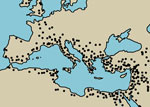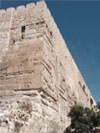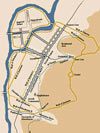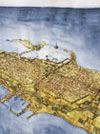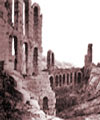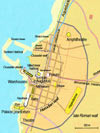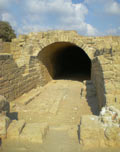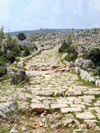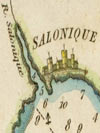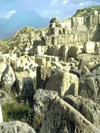
Discuss the world's favourite imaginary friend on the JNE YouTube channel
Dreamscape
"AD 30"
"And in those days Peter stood up in the midst of the disciples ... the number of names together were about a hundred and twenty." – Acts 1.15.
"And so were the churches established in the faith, and increased in number daily." – Acts 16:5
"AD 100"
In the Christian dreamscape the faith grows exponentially. Every town and region referred to in the holy story is accorded a flourishing church "just like that".
Maps reflecting this vanity are to be found in every Church "history". In reality, evidence of the church in the 1st, 2nd and even 3rd century is virtually nonexistent.
To Boldly Go
"Bold" has remained a favourite word of Christian apologetics, nicely conveying a fearless assertiveness stopping short of overbearing aggression. The word is used no fewer than 27 times in the King James version of Acts and the Pauline epistles.
Lost in Space
Nothing is known of most of the disciples:
*Andrew, Philip, Bartholomew- Nathanael, Matthew-Levi, Thomas-Judas -Didymus, James son of Alphaeus, Simon the Zealot.
Jerusalem
Paul - "I was personally unknown to the churches of Judea that are in Christ." – Galatians 1.22.
"We know relatively little of the mother-church in Judaea. Most of the twelve disciples disappear from history ...By the 3rd century romantic legends began, describing the missionary travels of the twelve ... They are derived from the apocryphal romances about the apostles which became widespread popular reading in the latter half of the 2nd century,"
– Henry Chadwick, The Early Church, p17.
Damascus
"The origins of the church in Rome, like those of Damascus, are shrouded in obscurity."
– Jerome Murphy-O'Connor, Paul, A Critical Life, p333
Antioch
"Paul tells us nothing about the evangelization of Antioch. Luke's rather detailed account is a complex mix of tradition and redaction."
– Jerome Murphy-O'Connor, Paul, A Critical Life, p147
Alexandria
"Though their origins are shrouded in obscurity, there were probably churches in the great cities of Alexandria and Carthage.
According to more disputed traditions, Mark helped found the church in the city of Alexandria, and Thaddeus the church in Edessa."
– W. Ward Gasque, The History of Christianity, p66.
"The earliest Christians from Alexandria to leave substantial works, Clement and Origen in the first half of the 3rd century, also adopted allegorical and symbolical readings of the Scriptures."
– Bagnall, Rathbone, Egypt from Alexander to the Copts, p39.
Athens
"One reason why the martyrs were few is that the Christians were also few ... Down to the time of Constantine, and later, there were no large Christian temples in Athens.
In 529 the schools of philosophy were closed. From that date Christianity had no rival in Athens."
Ephesus
"The churches of Asia salute you. Aquila and Priscilla salute you much in the Lord, with the church that is in their house." – 1 Corinthians 16.19.
"Prisca and Aquila, therefore, were the real founders of the church at Ephesus ... It was definitely not in Luke's interest to invent the activity of people such as Prisca and Aquila ... the couple, he insinuates, were acting in collaboration with Paul."
– Jerome Murphy-O'Connor, Paul, A Critical Life, p171
Paul himself reports not missionary success from Asia but anguish:
"For we would not, brethren, have you ignorant of our trouble which came to us in Asia, that we were pressed out of measure, above strength, insomuch that we despaired even of life." – 2 Corinthians 1.8.
Rome
"Greet Priscilla and Aquila my helpers in Christ Jesus ... Likewise greet the church that is in their house." – Romans 3-5.
"Paul's letter to the Romans implies that there was an important and already long-established community in the capital of the empire.
If Peter's coming to Rome is a traditionally accepted fact, the texts which tell us about it are late and uncertain."
– Jean Comby, How to Read Church History, p15.
Agenda driven
"St Luke evidently regards the arrival of Paul at Rome as the consummation of the work of the Apostles, and closes the Acts with the event, as if to show that when the Gospel had reached Rome its world-wide diffusion was assured."
– L. J. Foakes Jackson, History of the Christian Church, p38.
Caesarea
"Despite knowledge that Christianity was actively practiced in Caesarea during the reign of Eusebius, archeologists have not been able to find excavations of an actual church dating back to the 3rd century.
Indeed, the first church found in Caesarea dates back to the 6th century AD." – Holy Land Voyager
Caesarea's Mithraeum (3rd century)
Caesarea was a thoroughly pagan city in which relations between the Jewish minority and the non-Jewish inhabitants were always acrimonious.
For most of the 1st century, the city housed units of the 10th Legion Fretensis which recruited in Syria. The 10th was repeatedly deployed in punitive action against the Jews.
Thus, Josephus reports one such deployment following a Jewish massacre of Samaritan villages (in the "Acrabatene toparchy", south-east of Shechem):
"But Cumanus took one troop of horsemen, called the Troop of Sebaste, out of Caesarea, and came to the assistance of those that were spoiled." – Wars, 2.12.5.
All of which makes the "first Gentile convert", Cornelius, " a centurion of the Italian band" (Acts 10.1), who feared the Jewish god, "gave much alms to the people", was "of good report among all the nation of the Jews" (Acts 10.22), and fell at the feet of Peter, the most improbable Roman officer ever conceived.
As it happens, Josephus reports that during the siege of Jerusalem by Pompey, it was a "Cornelius, son of Sylla" who first made it over the wall; and again, it was a Cornelius who encouraged his brother to die bravely during the burning of the temple portico in 70. Luke's inspiration?
Tarsus
"At Tarsus ... no record of any family of Jewish citizens remains except the family of Paul himself."
– Sir William Ramsay, Cities of St Paul, p255.
Thessalonica
If Paul's second letter to the Thessalonians has any credence it indicates that the church in the city had existed long enough to have "traditions" – scarcely compatible with a recent Pauline foundation!
"Therefore, brethren, stand fast, and hold the traditions which ye have been taught, whether by word, or our epistle." – 2 Thessalonians 2.15.
Laodicea
"Although Paul mentions the church there is no record that he visited it." – Rudwick, Hemer, Bible Places, p194.
Paul supposedly lived for more than two years at Ephesus, and yet the great missionary never made the 100 mile trip up the Maeander valley?
Corinth
From the horse's mouth. When Paul arrived in Corinth the Lord himself showed up in a night vision to reassure the apostle that He already had "many people in this city." – Acts 18.10.
So was Paul really the great pioneering missionary?!
Is it not, in fact, possible that the church of Corinth, like of Rome itself, had no charismatic founder?
|
One of the most startling facts of early Christianity – yet one seldom commented upon – is that complete obscurity surrounds the foundation of its churches in all of the major cities of the Roman Empire. Those very churches which would define dogma, marshall the legions of the faithful and wield state power for millennia, present the interested enquirer with a mystery: How did they begin? Legends and "traditions" abound, of course, and apologetics is quite insistent that the "rapid growth of the church" is a primary proof and validation of the Resurrection and the claims of Christianity. But sober historical evidence is absent. Into this void in real history leaks a wondrous tale of the pioneers of the faith, Acts of the Apostles. This fable synthesizes an idealized version of events in a world of tireless apostles and bold evangelization; of recalcitrant Jews easily neutralized; of fraternal disputes quickly resolved; of cruel persecutions met with stoicism and forbearance; of divine and angelic interventions; and of immediate, mass conversions. Reality, however, tells a different story. Unlike in the later centuries of Christian conquest, when ambitious missionaries, backed by armies, destroyed indigenous gods and compelled the acceptance of Christ, early Christianity of necessity spread by an entirely different method. But the idea that the mechanism at work was the "bold evangelism" of a handful of charismatic apostles, armed only with the power of the Holy Spirit, is a fairy tale which should convince only the faithful.
Heroes great and small
Of Rome, Alexandria, Antioch and Carthage – the four leading capitals of the Roman empire – secular history has much to say about their churches and acrimonious sectarian disputes from the 4th century onward, that is, from a time after the church had grasped power. But the first faltering steps of the organized Christian faith remain opaque. Even churches which "feature" in the New Testament story, such as at Ephesus, Damascus and Athens, have curiously uncertain origins. Many of the micro-dramas of Acts are confined to marginal settlements and towns which disappeared from the historical record. The tale, even excusing the miraculous as pious embellishment, is a poor fit with what little "fact" can be gleaned from secular history, a handful of epistles ostensibly written by the main player, and commonsense. Every step of the supposed epic evangelical achievement – the glorious winning of hearts and minds for Christ – raises conundrums and "difficulties" for those compelled to believe that, somehow, "truth" is to be found here.
Acts of the Apostles? No kidding!
Acts of the Apostles is a misnomer because most of "the twelve", commissioned by the Lord to take the good news to "to the uttermost ends of the earth", are not even mentioned. The original disciples, chosen by Jesus to be "fishers of men", actually fade into oblivion soon after JC himself exits the holy melodrama. There is a curious switch of dramatis personae half way through the Acts of the Apostles – and the substitutes are "Grecians". Two of Jesus' "inner circle" – James and John, the sons of Zebedee and witnesses to such key events as the "transfiguration" – disappear from the story after Acts 12.2, when James supposedly is killed by the Jewish king Agrippa I. Odd as it might seem, a few verses later, Peter, arrested in the same "persecution", escapes (with the assistance of an angel!) and tells the faithful "Go show these things to James and the brethren." (Acts 12.17). Up to this point, the only James we know anything about is James the son of Zebedee. It required the creative genius of 2nd century Christian "historian" Hegesippus to gloss over this particular slip. Hegesippus managed to conflate the passing references at Matthew 13:55 and Mark 6.3 to the brethren of Jesus ("James, and Joses, and Simon and Judas") with Paul's references to a James "brother of the Lord" in Galatians 1.19 and "James and Cephas and John, the ones who seemed to be pillars" in Galatians 2.9. He produces a new, super-James, a James who is fast-tracked behind the scenes into the leading position of "first bishop of Jerusalem." This new James makes a favourably ruling on circumcision for the Gentiles of Antioch, Syria and Cilicia – and never says another word! Brother John Zebedee also disappears after Acts 12.2 but "John Mark" takes over at this point – "Mark" of course being a quintessential Roman name. Peter, the illustrious third member of the triumvirate and star performing in the early chapters, is not heard of again after the "Council of Jerusalem" of Acts 15 – and in this story he certainly does not turn up in Rome to play Pope. It is a a curious anti-climax for the "rock" on which the church is supposedly to be built. Matthias, the replacement for the hapless Judas, is never mentioned again after his election at Acts 1.26 and of the rest of the original posse, seven* of the twelve are not mentioned after a listing in the first chapter of Acts. An eighth disciple, variously known as Thaddeus, Lebbaeus or Jude, is not mentioned in Acts at all. So much for three years on the road with a miracle-working godman!
To Infinity ... and Beyond!
Stephen's sole literary purpose is to give one big speech – one of the longest and most articulate in the whole New Testament. The speech is so critical of the Jews that the priests "gnashed their teeth" and condemned him to a stoning. Unlike the dead messiah, Stephen gets no trial before the Roman governor – the Jewish priests have suddenly acquired the power of capital punishment! The execution provided a pretext for the "dispersal" of the brothers and the seeding of churches across the world. As if.
Man on a Mission Curiously, the first missionary mentioned by Acts of the Apostles is Philip the deacon (NOT to be confused with Philip the disciple, not heard of again), who as one of "the seven Hellenists" is apparently appointed to "wait on tables" (it's true, Acts 6.2) and care for widows. But Philip spends little time on welfare work. Fleeing Jerusalem after the death of the first martyr, he makes a foray to the city of Samaria where it just so happens that a rival magician Simon has long bewitched "all the people from the least to the greatest". Empowered with Jesus magic, the new man Philip stages a coup – he is able to upstage the hugely popular Simon with better "signs and miracles" and wins both men and women for Christ. Even Simon himself converts! It's an odd story and actually serves as a pretext for disciples Peter and John to leave Jerusalem and belatedly join the party in Samaria where they deliver the Holy Ghost by the laying on of hands – evidently one magic trick Philip could not perform! The baptized Simon now sours the jubilation by trying to buy the power of hand-delivery of the Holy Ghost and gets cursed mightily for his audacity. What all this nonsense suggests is that the early Jerusalem-based Jesus cult faced a serious rival centred on Samaria. The fanciful easy triumph wrought by the apostles was a propaganda weapon in the struggle to eliminate the competition. It is significant that "Simon Magus" would ever after be regarded by the Church as the father of all gnostic heresies.
Exit Philip Beyond the early communistic church of Jerusalem itself (Acts 2.42-47; 32-37), which in every sense is presented as a collective endeavour, there is nothing to suggest that the original twelve apostles had a hand in established churches. True, Acts reports that Peter made a sortie to towns close to Jerusalem – Lydda, Joppa and Caesarea – but it is far from clear that the "prince of the apostles" actually established churches. At Lydda, says Acts, there were brethren already in residence:
The pioneer evangelist of Lydda, Joppa and Caesarea again appears to have been Philip the deacon who "passing through he preached in all the cities, till he came to Caesarea." (Acts 8.40). It seems that the pagan capital became Philip's permanent residence and the centre of a family prophecy business – as we learn later in Acts:
Nor does Philip put in an appearance during the two years that Paul supposedly spent in "open prison" in Caesarea, subject to frequent questioning by the governor Felix "hoping for money" (Acts 24.25). Did Philip, perhaps, take early retirement?
Is it a bird? Is it a plane? It's Paul of Tarsus! After the preliminary chapters Acts stars one apostle above and beyond all others, St Paul, a super-apostle who is nothing less than a religious genius. Paul is both groundbreaking theorist and dynamic practitioner, whose contribution to Christian doctrine eclipses the words of the godman himself, whose vast peregrinations overshadow the local meanderings of the Galilean carpenter, and whose practical skill in allegedly establishing churches is without parallel. And all this from one who was never chosen to be a "fisher of men", a pugnacious character whose work transcends the collective efforts of "the twelve" and yet never met the saviour in life nor heard his words. Did Paul, self-proclaimed Apostle to the Gentiles, really establish churches? Read closely, Acts of the Apostles actually relates that when the super-apostle Paul arrived in towns along his itinerary there were, in most cases, already Christians there to greet him – shadowy, unnamed brethren who meet, host and proclaim the star missionary and help the great man on his way. Without their timely presence the tale could scarcely amble along. For example, Paul's story begins on the road to Damascus, where, as the unredeemed "Saul", Paul is intent on bringing "disciples of the Lord ... bound to Jerusalem." – Acts 9.1-2. After divine intervention the blinded apostle is guided by "a certain disciple at Damascus, named Ananias" and with his sight restored Paul is "in the company of disciples" (Acts 9.19). Clearly the church at Damascus has non-Pauline origins – although it is the farcical "escape" of the apostle from the city that wins the plaudits. The base for Paul's legendary journeys of course was Antioch – third greatest city of the Roman empire and military headquarters for the eastern provinces. Yet clearly a highly successful church had been established before Paul entered the drama – the work of Jews from Cyprus and Cyrene.
First Mission In contrast to the enigma of Antioch, Acts records in copious detail Paul's adventures in such hick towns as Lystra and Derbe, whose very existence was forgotten by the Middle Ages. Paul, who supposedly got his start in the evangelizing business from the church of Antioch, goes first to Cyprus – the very island that had itself evangelized Antioch! – and his brief visit basks in eternal glory (à la Peter) for the conversion of a single Roman official! At Lystra, Paul, in the company of Barnabas, encounters capricious pagans and then Jews arriving from distant Iconium, who stone him and dump him for dead. Yet oddly, "disciples gathered around him; he got up and went back into the city." – Acts 14.20. Just where did those disciples come from? At the end of his first missionary journey Paul passes through Phoenicia and Samaria, "brought on his way by the church", where his tale of Gentile conversions brings "great joy to all the brethren" (Acts 15.3). But who has established churches in Phoenicia? Again, we are presented with the spontaneous emergence of believers with no obvious evangelical crusader to credit.
Second Mission The same riddle is found at the start of the second missionary journey when Paul goes through Syria and Cilicia "confirming the churches" (Acts 15.41) – that is to say, churches already in existence. For Paul this is no return to a previous foundation – the regions were not part of his first evangelical odyssey. Important centres of early Christianity, like Edessa, Samosata, Mopsuestia and Apamea, know nothing of the great evangelist. In Philippi, it is true, Paul does not find Christians – instead he finds Lydia "who worshipped God" (Acts 16.14) – a proselyte so keen she embraces Christianity after a single sermon! It is a similar story at Thessalonika where it seems a "great multitude of Greeks and chief women" already attend the synagogue and are "reasoned" into Christianity in three weeks or less (Acts 17.1-4). Sent on by the newly converted brethren, even the Jews of Berea, more "noble" than the lewd fellows of Thessalonika, "received the word". The ease of conversion from both paganism and Judaism beggars belief. "Brethren" of unknown origin now conduct Paul to Athens (Acts 17.14-15) where Paul chalks up just two converts, Dionysius the Areopagite and Damaris. Despite the obviously limited success in the city Dionysius was upgraded to "first bishop" of Athens by his namesake, a late 2nd century bishop of Corinth. "Tradition" makes Damaris the wife of Dionysius and paradoxically introduces "Hierotheos the Thesmothete" as another "first bishop", a name unknown to Acts. Christian apologists at Athens include Quadratus, Aristeides and Athenagoras but they all date from the 2nd century. It seems certain that Christianity came late to Athens – and in the teeth of pagan resistance. But in Corinth the apostle was on easy street again: Jewish Christians from Rome (Aquila and Priscilla) were there to meet and greet our hero (Acts 18.2) and even leaders of the synagogue readily convert. Even better, Jesus himself shows up in a night vision to reassure the apostle that already he has "many people in this city" (Acts 18.10). Yet Paul's own epistles tell a story not of unity and conversions but of discord and "contentions". Paul speaks of the factions of Apollos and Cephas, of legalizers and those who decry his apostleship. Paul even thanks God that he had no hand in baptizing anyone! (1 Corinthians 1.14).
Third Mission On his third mission Acts tells us that Paul was "strengthening all the disciples" throughout Galatia and Phrygia. Clearly the creed had spread and that had precious little to do with Paul. This is made explicit at Ephesus where Paul arrives and "finds certain disciples" (Acts 19.1). He had previously, of course, been forbidden by the Holy Spirit from entering Asia and had passed quickly through the city on his earlier journey. Perhaps the brethren of Ephesus were converts made by Apollos, active in the city before Paul; or Aquila and Priscilla, relocated from Corinth. The neophytes might even be the result of the mission of St John and the Blessed Virgin Mary, by "tradition" and bogus artifacts long-term residents of Ephesus, although their presence is completely unknown either to the author of Acts or Paul himself. In Ephesus there were even, it seems, "vagabond Jews" (Acts 19.13) pirating Paul's exorcism tricks! Paul passed two years in the city, selling "handkerchiefs from his body" to cure sickness (Acts 19.12) and provoking a riot of silversmiths, worried about their jobs (Acts 19.26-41) – both events which, if ever true, would have surely drawn the gullible and insecure into the church. But in no sense can it be said Paul was a founder of the Ephesian church. And "tradition" concurs:
Back to base, on to Rome On his return from the third missionary journey Paul lands first at Tyre and "finding disciples, tarried there seven days" (Acts 21.3-4.) and then at Ptolemais, where he "saluted the brethren, and abode with them one day." (Acts 21.7.). At Caesarea, Paul lodges with Philip the evangelist and meets "disciples of Caesarea" (Acts 21.16) – one assumes the converts of Philip. On the final trip to Rome, Paul's ship calls first at Sidon, where his jailer allows him to "go to his friends to refresh himself" (Acts 27.3.) – and presumably these friends could only have been Christians (Paul condemns friendship with unbelievers in 2 Corinthians 6.14). Paul's landing in Italy was at Puteoli "where we found brethren" (Acts 28.14) and as his party progressed towards the capital "brethren ... heard of the approach" – and came out to meet him. One wonders, was there some sort of pony express? "He's coming, HE"S COMING!" Apparently, the brethren from Rome travel as far as a junction called The Three Taverns, twelve miles from the city, and to Appius' Market – forty miles from Rome! And these are brethren who have never met the great man. The yarn, in fact, is a bizarre and unworldly mix of the arrival of a grandee from the east (complete with his own guard!) and the transport of a humble prisoner in chains, suffering torments for his faith! The apostle subsequently holds court in his own private residence for the next two years (Caesarea déjà vu!), summoning Jewish elders and "receiving all who came." As if.
Demon Seed
Paul's glorious evangelical triumph is illusory and unconvincing. "Paul the letter writer" – arguably a real individual and revered saint of the Marcionites – is transformed by Acts of the Apostles into a larger than life evangelist who seeds a universal church across the Mediterranean. His passage – quixotically accompanied by miracle healings and cruel punishments, audiences with grandees and periodic imprisonments – provides doctrinal unity and conformity of practice to a church seeking to quell misguided factionalism and discord. It all ends gloriously with the revered saint proclaiming the Word at the heart of the world. Yet that claim is undermined continuously by the tacit admission in Acts itself that Paul, the founder of churches, is not really a founder at all. At best, Paul is the enforcer of orthodoxy on a miscellany of disparate groups and isolated couples, evidently incapable of organizing themselves into functioning, true churches without his masterful touch. Obscured as it is by the "myth of Paul", Acts concedes – and secular history confirms – that all the really important churches owed nothing to Paul at all. The yarn of Acts, forgiving all its miraculous fancies, fails to explain the actual emergence of churches. If Acts is our guide, the simple literary device of "witch hunt and dispersal" is all that holds up the notion that churches blossomed across the eastern Mediterranean because "something rather glorious" happened in Jerusalem. Implicitly, then, Christianity seeded itself in all the major cities of the Roman empire without the "bold evangelism" of fearless apostles. Rational Christian writers are obliged to speculate that a low-impact evangelization must also have occurred but the argument is an exercise in wishful thinking, presupposing that devout Jews journeyed to Jerusalem, experienced a religious transformation, set aside the ancestral faith that had motivated their journey, and returned home Christians. Modern apologists, in the dreamscape of their own minds, complete the fantasy that the author of Acts leaves dangling. No doubt they could describe, in exquisite detail, how visiting Jews from Cyrene or Smyrna, from Ptolemais or Sinope, on their way to or from the Temple, were engaged in discourse by excited members of "the Way", who persuaded them out of their faith and into devotion to the new Christ cult. Dream on.
Late and Fake – a 2nd century Catholicizing invention
The author of Acts of the Apostles at no point claims to be reminiscing personal experiences, which is surprising for a Luke who had been the close companion of "Paul the Missionary". But doubts about the "authenticity" of Acts (and the gospel of Luke) are many and varied. On the most favourable reading, "Luke" is an obscure minor character from the epistles of Paul, not mentioned in any of the gospels. But then, paradoxically, the author of Acts, who writes "Paul's biography", is completely ignorant of the Pauline epistles! Why would an eye-witness reiterate so much of the testimony of a non-witness? Luke includes about 70 per cent of the material of Mark, who was not a disciple but a companion of Paul. Many of the additional pericopes and much of the "detail" that Luke uses derives from the secular histories of Josephus, the late 1st century Jewish historian. A clue to establishing the genuine origin of Acts is the opening address to his sponsor, a "most excellent Theophilus". As many scholars have observed, the only illustrious churchman of that name known in the early church was a bishop, Theophilus of Antioch, circa 169-177. That the author of Acts (and Luke) did indeed address his work to this Theophilus is supported by the fact that the noble bishop, in his own extensive writings, never mentions Christ or Jesus at all! Theophilus is aware of "gospels" – which he does not name – and describes them as "recent". For the bishop, Christians are so-named because they are "anointed" with the oil of God and have received their doctrines directly from the creator through the agency of the Word or Wisdom. We can thus see the intrusion into late 2nd century history an edifying origins tale. "Luke" is urging upon the noble Christian bishop acceptance of a novel story that the Word had incarnated as flesh in the man Jesus. This divine being had performed wondrous deeds on earth and had entrusted his chosen band with a world mission. "Part two" – Acts of the Apostles – closes the deal. Paul, now an idealized progenitor, projected back into the 1st century but with his 2nd century theology intact, snakes his way across the known world, working miracles and "confirming" churches. Disparate sectarians are drawn into a universal catholic church, either by the fleeting passage of the great apostle traipsing across a fanciful landscape or by the receipt of his epistles, chastising their behaviour and correcting their errors.
So how DID the churches begin? A more compelling scenario is that from the 1st century BC to the 2nd century AD "Christian-like" cults were emerging from a variety of long-established forms of devotion, transformed local fraternities which had been rudely shaken by the arrival of Rome and assimilation into a world empire. The very tolerance of Rome created a competitive marketplace of religious devotions, made more variegated by the flow of trade and the ease of travel. Along the arteries of empire, together with the manpower, crops and precious metals, went the folklore and superstitions of a hundred diverse cultures. In the cities of the eastern Mediterranean Jewish necromancers and Hindu priests jostled with Persian mystics and Buddhist monks. The gods of Boeotia, Memphis, Pessinus and Emesa took a second home in Rome. Weaker gods became adjuncts or "aspects" of the stronger deities. Exotic, titillating expressions of the Oriental imports were added to the dour character of the traditional Roman gods. Myriad pagan enthusiasms fed into a nebulous and widely dispersed "solar deity movement" which embraced – in blissful ignorance of any Judaean pageant – a creator god who communed with his devotees via dreams, spirits and logos. Psychotropic plants and vapours leaking from the earth confirmed this intercourse with the spirit realm. Visits to ancient shrines and sanctuaries, patronized and revitalized by the Roman elite, became safer and more popular, strengthening the traditions of holy pageants and pilgrimage. From the schools of philosophy, particularly Stoicism, came a more secular response, a language of "theology" and a system of ethics which would, in time, be commandeered by the "Church Fathers". Into this heady brew was intruded a god-man, the Emperor. The Imperial cult gave visible form to a personified saviour of the world, its sanctuaries taking up a magisterial presence in the heart of the new metropolitan centres – such as Caesarea, Corinth, Philippi and Antioch – and every other city "visited by Paul!". Augustus had been born a man but a man who had pacified the whole world and had the power of life and death over sixty million subjects. Unquestionably he was beloved of the gods and would be raised among them. Judaism, challenged in its very heartland by the mores of a pagan imperialism, fractured into sects which both resisted and accommodated the unyielding power of Rome. The Messianic response would lurch first towards war and, in defeat, towards a passive-Messianism. Its first form was eschatological, a morbid anticipation of the world's end and Judgment Day. But like all doomsday cults the annoying persistence of the world forced upon it an accommodation with reality, a dispensation in which "the church" would shepherd the faithful until a future divine intervention. This marginal "Jesus movement" would remain fractious and lack cohesion until adopted as an ideology by the Roman state. Politicized bishops would thereafter regularize its dogmas and give it direction and earthly purpose. In the following centuries the marketplace of religious enthusiasms would become ever narrower. After all, what more could anyone ever dream for than the Church of Christ, King of Kings, Lord of All, Saviour of the World, Bread of Life, First and Last ...
Sources:
'Save' a friend e-mail this page
Copyright © 2008
by Kenneth Humphreys.
|
|||||||||||||||||||||||||||||||||||||||||

